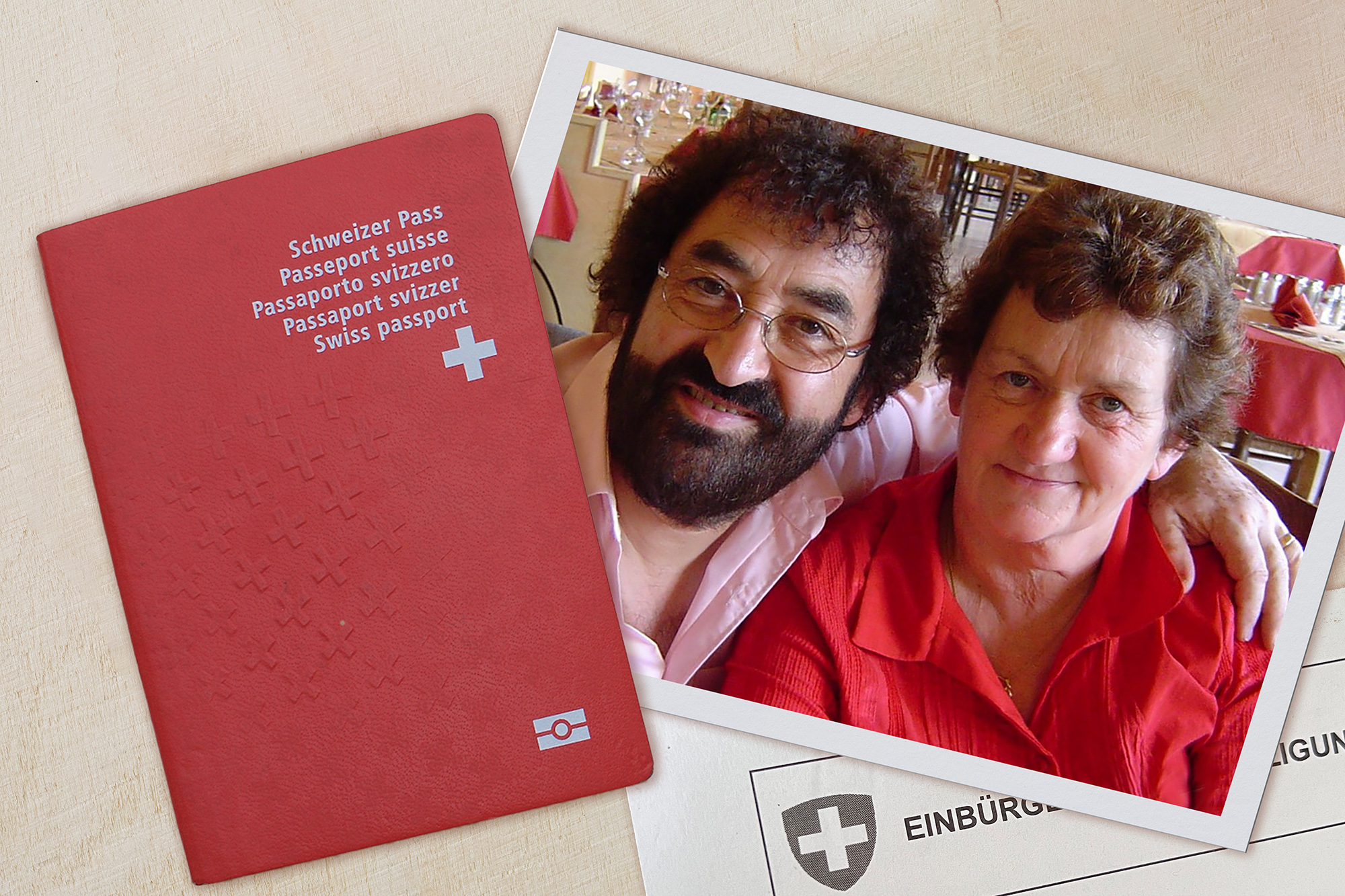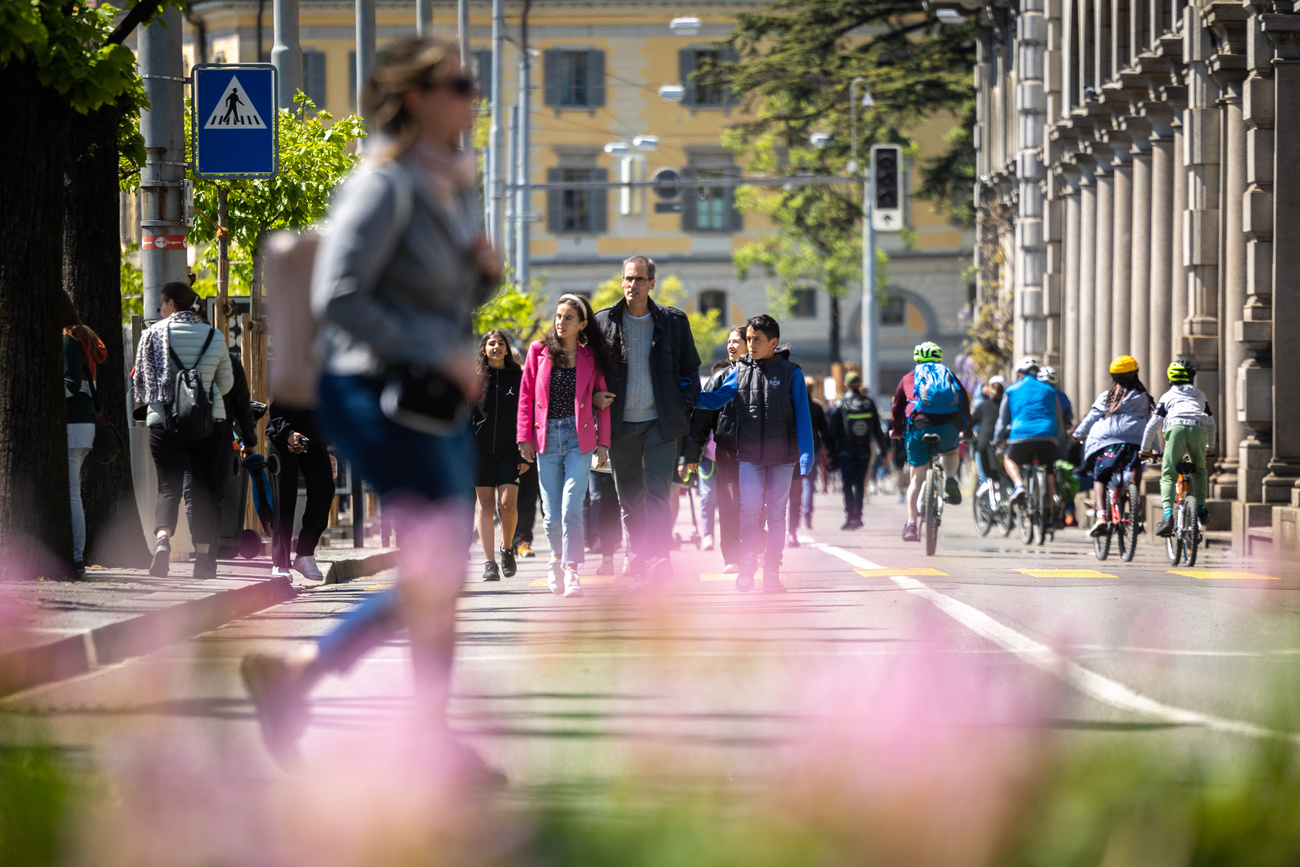Lost Swiss citizenship a surprising reality for many

Swiss citizenship is not always guaranteed for life. Many Swiss living abroad have lost it – often unwittingly, or due to historical rules. Their stories show just how deep an impact this loss can have.
Once Swiss, always Swiss. Actually, not so! Many people find it hard to imagine, but Swiss citizenship is not always guaranteed for life. Swiss citizens can lose their nationality – whether they want to or not – for various reasons.

More
How to get Swiss citizenship?
For many Swiss living abroad, this situation is a reality.
We asked our community how they had gained, or lost, Swiss citizenship. Over the past months, readers have shared their stories and contributed to our debate, giving rise to a collection of dozens of personal anecdotes from around the world.
When Swiss women married a foreigner
Many women wrote in to say they had lost their Swiss passport on marrying a foreign citizen. Up until 1952, the so-called marriage rule applied, under which thousands of women lost their Swiss citizenship for good when they married a foreigner. Then, from 1952 to 1992, Swiss women had to proactively declare that they wished to retain their Swiss nationality if they wed a non-Swiss. Many Swiss women abroad were unaware of this requirement.
“I had Swiss citizenship, as did my three sisters. I married a Chilean and lost it. I am the only one in my family who lost it,” wrote Carla R. The same happened to the mother of user Mollysuisse, who reported: “My mother was born in the US to two Swiss nationals, and unknowingly lost her citizenship in 1991 when she married a US citizen.” Her mother did not realise she had lost her citizenship until around 2010, after the ten-year reinstatement period had elapsed.
Others were luckier and were made aware of the applicable citizenship law, or were later able to reclaim their Swiss nationality. One of them is Lucia Chaves Minnig’s mother in Colombia: “My mother lost her citizenship when she married a Colombian. Many, many years later there was an amnesty and she got it back. My brothers and sisters, who wanted it too, got it.”
Meanwhile, user Bellarivaca wrote in: “Fortunately, I was told by a woman at the Swiss embassy that I had to state that I wanted to keep my Swiss citizenship before my wedding if I married a foreigner!”
>>> The consequences of this gender discrimination are still being felt today.

More
Swiss citizenship: discrimination against women continues
Citizenship never handed down
Many descendants of Swiss emigrants – mainly in South America – reported that they never had Swiss citizenship in the first place. This was because their forebears failed to register their offspring with the consulate.
“Unfortunately, my ancestors did not register their children at the consulates due to the difficulties that existed at the time,” wrote Eduardo Amstalden from Brazil. Meanwhile, Ana Ubelarte from Argentina speculated about the reasons for this omission: “Perhaps [it was] due to a lack of information, the difficult living conditions as immigrants, or the impossibility of travelling the long distances to the population centres in Argentina.”
Although some first-generation Swiss Abroad were later able to recover their citizenship, it was often too late for their children or grandchildren: “When confirming my father’s citizenship, the Swiss authorities extended it to my mother, but denied it to my siblings and myself because we were already over the legal age,” wrote Freddy from the Peruvian capital Lima.
More
Historical reasons
Anyone who emigrated around the year 1900, or earlier, to a country that did not allow dual citizenship had to renounce their Swiss citizenship. This is what happened to the forebears of João Gabriel Schelck from Brazil: “My line lost Swiss citizenship when my great-grandfather, Joseph Emmanuel Lugon, emigrated from Switzerland to Brazil. The deal was made by the king […] Dom John VI, who needed working labour in the country, and therefore signed a contract with dozens of Swiss. And one of the conditions of the deal was giving up Swiss citizenship and becoming a Brazilian citizen.” In the early 19th century, Brazil was part of a united kingdom with Portugal and the Algarves.
No passport, no roots
What all these cases have in common is the emotional impact caused by the loss, or lack, of Swiss citizenship. It is not just about formal status. For many, it also means a loss of roots and a deep feeling of injustice.
“I, who have half Swiss blood, am the same as a complete foreigner. That’s quite sad, because I’m very proud of my origins and roots, and I always try to represent my father’s cultural heritage in the best possible way,” lamented user swissjav from Argentina.
Karen Kuffer wrote: “Citizenship is not just a document; it is much more than that.” For her, it stands for full recognition of belonging to a political community, with rights and obligations. And the emotional and cultural ties that many Swiss descendants feel cannot be replaced by a certificate of heritage.
Cashing in on Swiss citizenship
Many of those who wrote in firmly refuted the accusation that they merely wanted to take advantage of Switzerland’s social system. “To claim that our interest in retaining our nationality is materialistic, is a biased and outrageous judgement,” exclaimed user descendientesuizos.
Meanwhile, Ana Uebelhart, the great-granddaughter of Swiss emigrants to Argentina, wrote in from Canada: “I am not driven by economic interests or benefits to be gained. I simply want to have the recognition of the nationality that is rightfully mine.” Silvana Thalmann from Argentina also countered the accusation: “As the granddaughter of a Swiss citizen, I am not looking for advantages. I am a qualified, cultivated, well-educated professional.”
In an increasingly interconnected world, jus sanguinis – when citizenship is passed on by descent – is not an instrument of exploitation, but a bridge that connects generations and cultures, Kuffer wrote. “We, the descendants of Swiss emigrants to South America, are not seeking any privileges. We are asking for recognition of a right that is ours through our heritage, as well as our love of and devotion to our Swiss identity.”
The concerns of the descendants of Swiss emigrants outside Europe have not gone unnoticed in Swiss politics. Last summer, a group of descendants submitted a petition to the Swiss parliament.

More
Thousands of emigrants’ descendants in Argentina demand Swiss citizenship
Parliamentarians are set to debate a motion calling for a special residence quotaExternal link for the descendants of Swiss nationals who do not, or no longer, hold a Swiss passport, so they can work in Switzerland and thus contribute more easily to the Swiss economy.
So the last word on the inheritance of Swiss citizenship has not yet been spoken.
More
Adapted from German by Julia Bassam/gw.

In compliance with the JTI standards
More: SWI swissinfo.ch certified by the Journalism Trust Initiative













You can find an overview of ongoing debates with our journalists here . Please join us!
If you want to start a conversation about a topic raised in this article or want to report factual errors, email us at english@swissinfo.ch.